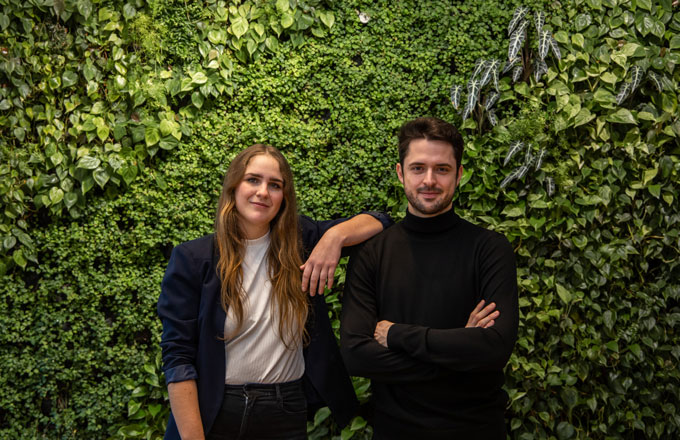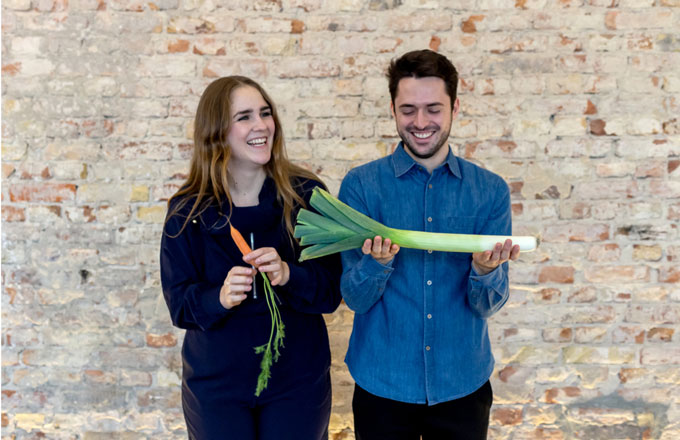HPI D-School Alumni develop slow media app "Rohpost"
More and more people experience stress through the use of social media. In times of the coronavirus pandemic, we spend even more time at our screens, which causes additional stress for many of us. An app called "Rohpost", which was developed by HPI D-School Alumni, can help to minimize these stress factors.
About two years ago, alumni Frederik Görtelmeyer and Mara Ziemann founded the so-called "Slow Media" app "Rohpost". With this app the two want to contribute to a stress-free and mindful use of media. In the interview, we talked about their idea, the use of Design Thinking in the development of the app and their vision for the future.
How did the idea for Rohpost come about and what convinced you to put the idea into practice?
Frederik: It started with the fact that we were dissatisfied with the existing social media. Mara and I met during our studies in Berlin. After the first year we both moved to another city for a while. During this time it was very difficult for us to keep in touch. From time to time we made video phone calls or wrote to each other via Messenger. But since we lived in different time zones and had a full everyday life, there wasn't always the opportunity for that.
Mara: On the other hand, we did not want to make our private life public on social networks. But even if we wrote a post from time to time, it got lost in the flood of other news, so that the other person often didn't even see it. For us, that was the starting point to think about how to make keeping in touch with digital media better.
Frederik: For us, the mass of information that one is confronted with on social media was a decisive factor that we wanted to address. But we soon realized that this problem is not limited to private communication. It can be said that users generally find it difficult to filter out the interesting and important things from the internet.
Mara: Today we can actually only rely on algorithms in search engines or social networks to do this job for us. However, algorithms cannot distinguish between what is culturally and ethically good or bad. And in cases of doubt, they are even deliberately programmed to fulfill certain economic interests that do not coincide with those of the user.
Frederik: What many social media lack is a healthy level of information consumption. With the internet we have got used to the fact that information can be distributed almost free of charge and without limits. But reduction and a certain amount of renunciation promote creativity and culture. Therefore, our idea was to create an app that deliberately provides a framework in which communication can take place.
What role did Design Thinking play in the development of Rohpost?
Frederik: We both studied Design Thinking at the D-School at HPI and I think that this education has had a lasting influence on the way we work. For us, the focus was always not to think from the product, but to focus on the user and his or her needs. When we started our project, it was not at all clear to us whether we would end up with an app or something completely different.
Mara: Our first prototype, for example, was a device that you can put in your living room. But after we had calculated the business model and talked to potential manufacturers, it became clear that we had to implement the planned functions differently. The result was the first concept for the Rohpost app.
Frederik: Later we did a lot of interviews with users. I remember days when we were out and about in the city asking people about our idea and their use of social media. In the meantime we are working with many great partners who write contributions for Rohpost. We see ourselves as a community and a good cooperation is very important for us. We meet regularly for workshops or calls, talk about further plans and collect ideas together.
What criteria do you use to select the startups and magazines whose content you publish on Rohpost?
Mara: The selection of media partners is one of the most important elements of Rohpost for us. We want users to find only high-quality and interesting content on the app. That's why we have developed common values with our partners, which determine how we want to work together and what standards we apply to the content on Rohpost. For example, it says in the values that there is no clickbait - i.e. headlines and texts designed to generate as many clicks as possible.
Frederik: For us, this also means that there can be no fake news or discriminatory content on Rohpost. Since we select our partners ourselves, we can pay close attention to this and react if contributions do not correspond to our values. Of course this also involves a great responsibility. But we see it above all as an opportunity to offer good content more attention. Basically, this makes us something like gallerists, but for media and other sources of information.
Mara: When we select new partners, we pay close attention to whether their content meets these requirements. If we immediately see advertising banners on a website and the texts look as if they were only written for the search engine, this is not a good sign. On the other hand, we also look to see whether the content of the media fits our needs. Our focus is on topics that are personally relevant for the reader: For example fitness, culture, travel or society.
What feedback have you received from users so far?
Mara: In the beginning many people were skeptical when we told them that we were starting a new social medium. Many felt that there were already enough platforms. Others were surprised that we were limiting communication on Rohpost. With us, for example, users can send a message to their friends only once a day.
Frederik: We have decided to decelerate the process in order to give more space to the important information. In the meantime we get very positive feedback from many users. Many feel overwhelmed by social media and are also otherwise rather critical of them. They feel like trying something different.
Mara: On the other hand, we are also getting very positive feedback from the media industry. People are worried about becoming more and more dependent on social networks to get attention for their own content. Accordingly, the interest in Rohpost is very high. Currently, new partners join our community every week.
What is your vision for the future? Do you hope to inspire other suppliers with your concept in the long term or do you consciously see yourself as an alternative?
Frederik: We see Rohpost as an alternative that focuses on sustainable communication and high-quality content. This is possible because we have chosen a different business model. Existing social networks generate a large part of their revenue by reusing user data and showing advertising. Their economic interest therefore depends on the companies that pay for their services. The media often go away empty-handed with this bill.
Mara: Our goal is to introduce a freemium model instead. That means: The basic functions of the app are and will remain free. But for full access to all functions and content you will need a subscription with a fair monthly price in the future. In this way, we can continue to put our users at the center of our activities. Only those who are completely satisfied with the app and see real added value in it, will be willing to pay for it.
Frederik: In addition, we will also be able to compensate our media partners in this way in the future. Platforms like Netflix have shown that this model is well suited to promote interesting content. We think that the same model also works for social media. But until it does, Rohpost can be used completely free of charge with an iOS or Android mobile phone.
Photos: Rohpost
The interview was conducted by Pauline Junginger.



